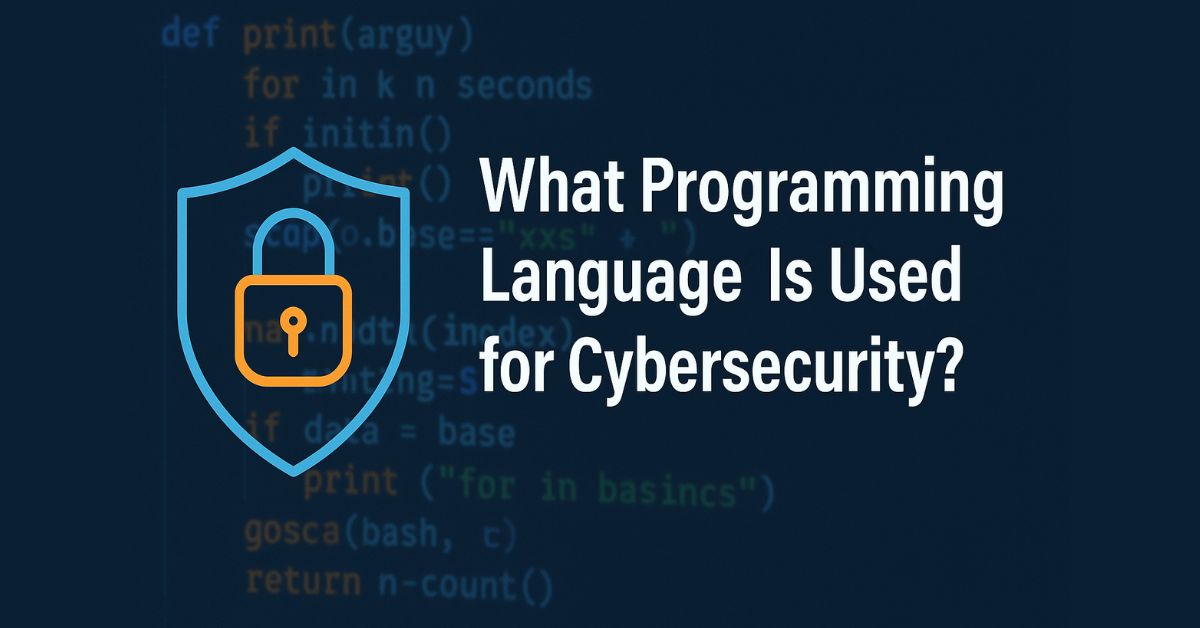In the modern digital world, cybersecurity has become a critical area of concern for businesses, governments, and individuals. With the growing threat of cyberattacks, data breaches, and hacking attempts, the demand for skilled cybersecurity professionals continues to rise. One question that often comes up among aspiring cybersecurity experts is: What programming language is used for cybersecurity?
The truth is, there is no one-size-fits-all answer. Different areas of cybersecurity require different programming languages. From scripting and automation to malware analysis and web security, here’s a detailed guide to the top programming languages used in cybersecurity, their use cases, and why they matter.
1. Python: The Most Popular Language in Cybersecurity
When it comes to cybersecurity, Python reigns supreme. It is widely regarded as one of the best programming languages for both beginners and seasoned professionals. Python is easy to read and write, making it ideal for creating automation scripts, penetration testing tools, and security applications.
Why Python is crucial in cybersecurity:
- Fast development and prototyping
- Extensive libraries (like Scapy, Nmap, Requests)
- Large community and plenty of learning resources
- Used for malware analysis, forensics, automation, and web application scanning
Cybersecurity tools built with Python:
- W3af – Web Application Attack and Audit Framework
- Volatility – Memory forensics tool
- Scapy – Network packet manipulation tool
Python is especially useful in penetration testing and ethical hacking, making it a must-learn language for those entering the field.
2. C and C++: System-Level Programming for Security Experts
C and C++ are low-level programming languages used to develop system software, hardware drivers, and performance-critical applications. In cybersecurity, these languages are vital for reverse engineering, exploit development, and understanding operating systems at the kernel level.
Why C and C++ are important:
- Direct access to memory and system resources
- Used for writing malware and analyzing binaries
- Help understand how vulnerabilities like buffer overflows work
Use cases:
- Malware analysis
- Writing custom exploits
- Developing security patches and secure code
If you’re interested in working as a penetration tester, reverse engineer, or security researcher, proficiency in C or C++ is highly recommended.
3. JavaScript: Web Application Security and XSS Testing
With the internet being a major attack surface, JavaScript plays a central role in web security. It is the language of the browser and is essential for understanding client-side vulnerabilities.
Why JavaScript is used in cybersecurity:
- Helps test web apps for Cross-Site Scripting (XSS)
- Assists in developing browser-based attack simulations
- Supports analysis of JavaScript-based malware
Cybersecurity experts use JavaScript to understand the behavior of web applications and to uncover common vulnerabilities in client-side code. For bug bounty hunters and web application testers, JavaScript is a key tool in the toolkit.
4. Java: Secure Enterprise and Android Applications
Java is still heavily used in enterprise environments and is the primary language for Android development. Cybersecurity professionals working with enterprise networks or mobile security need to understand Java to secure these systems effectively.
Why Java matters in cybersecurity:
- Used in corporate software and web servers
- Important for Android app security and malware detection
- Plays a role in securing application logic and APIs
Professionals analyzing Android malware or conducting mobile app penetration testing must have solid Java skills. It’s also helpful in writing secure code for backend systems.
5. SQL: Database Security and Injection Prevention
While not a general-purpose programming language, SQL (Structured Query Language) is vital for cybersecurity, especially in the realm of database security. Cybercriminals frequently use SQL injection to exploit poorly coded web applications.
Why SQL is essential:
- Used to understand and secure databases
- Helps detect and prevent SQL injection attacks
- Aids in data leak investigation and breach response
A cybersecurity expert who can write and analyze SQL queries is more effective in safeguarding sensitive information. Pairing SQL knowledge with web development and scripting gives you a powerful edge in security analysis.
6. Bash and PowerShell: Scripting for System and Network Security
For automating tasks and handling system administration securely, Bash (Linux/Unix) and PowerShell (Windows) are indispensable. These scripting languages help security analysts automate routine checks, monitor file systems, and respond to incidents quickly.
Use cases:
- Automating penetration testing tools
- Creating custom scripts for system monitoring
- Conducting forensics and incident response
PowerShell, in particular, is a favorite for Windows system administrators and red teamers. Understanding these scripting languages allows cybersecurity professionals to build custom tools and streamline workflows.
7. Go (Golang): High-Performance Security Tools
Go, also known as Golang, is a modern language developed by Google. It’s gaining popularity in the cybersecurity community due to its speed, efficiency, and cross-platform compatibility.
Benefits of using Go in cybersecurity:
- Statically compiled, resulting in faster performance
- Ideal for building scalable security tools
- Supports concurrency, making it excellent for networking tasks
Security tools written in Go:
- Amass – Used for DNS enumeration and asset discovery
- Gobuster – For directory and DNS brute-forcing
Go is particularly suited for professionals interested in cloud security, DevSecOps, and developing custom tools that require performance and scalability.
Which Programming Language Should You Learn First for Cybersecurity?
If you’re just starting your journey into cybersecurity, your first step should be learning Python. It offers a smooth learning curve and immediate practical application in automation, penetration testing, and data analysis.
Once you’re comfortable with Python, expand your skills based on your interests:
- Learn C/C++ for exploit development and reverse engineering.
- Understand JavaScript for web application testing.
- Pick up SQL to secure and analyze databases.
- Master Bash and PowerShell for automation and scripting.
- Explore Go for building efficient and powerful security tools.
Final Thoughts: Language Skills Empower Cyber Defenders
Understanding programming languages empowers cybersecurity professionals to analyze, detect, and respond to security threats effectively. Whether you’re automating malware analysis with Python, discovering web vulnerabilities with JavaScript, or analyzing low-level exploits with C/C++, each language has a unique role in the cyber defense landscape.
To summarize:
| Language | Best For |
| Python | Scripting, automation, malware analysis |
| C/C++ | Exploit development, reverse engineering |
| JavaScript | Web security, XSS testing |
| Java | Android and enterprise application security |
| SQL | Database security, injection prevention |
| Bash/PowerShell | System automation, forensics |
| Go (Golang) | High-performance tools, cloud security |
Start with one language, build projects, and grow your skills. In the ever-evolving field of cybersecurity, programming knowledge will always be one of your most powerful weapons.
FAQs
1. What is the best programming language to learn for cybersecurity?
Python is widely considered the best programming language for beginners in cybersecurity. Its simplicity, readability, and extensive libraries make it ideal for automation, penetration testing, malware analysis, and scripting.
2. Is C or C++ useful for cybersecurity?
Yes, C and C++ are essential for understanding system-level operations, reverse engineering, and exploit development. These languages allow direct memory access, making them perfect for analyzing vulnerabilities like buffer overflows.
3. Do I need to know programming for a career in cybersecurity?
While not all cybersecurity roles require deep coding knowledge, programming is highly beneficial. It enables automation, vulnerability analysis, scripting, and the creation of custom security tools, giving professionals a competitive edge.
4. Is JavaScript important in cybersecurity?
Yes, JavaScript is crucial for web application security. It’s used to analyze client-side vulnerabilities such as Cross-Site Scripting (XSS) and helps in ethical hacking and browser-based attack simulations.
5. How is SQL used in cybersecurity?
SQL is primarily used to manage and secure databases. Understanding SQL helps cybersecurity professionals detect and prevent SQL injection attacks, one of the most common web vulnerabilities.
6. Should I learn Bash or PowerShell for cybersecurity?
Both are valuable. Bash is essential for Linux systems, while PowerShell is key for Windows environments. They are used for automation, scripting, forensic analysis, and incident response tasks.
7. What is Golang used for in cybersecurity?
Go (Golang) is gaining popularity for building efficient and scalable cybersecurity tools. Its speed and ease of deployment make it ideal for developing cloud-based security software and network scanners.
8. Which language is used to create malware?
Malware can be written in various languages, but C, C++, and Python are commonly used. C/C++ offer low-level system access, while Python allows rapid development and obfuscation.
9. Can I work in cybersecurity without learning Java?
Yes, but if you’re working in enterprise security or mobile (Android) app testing, learning Java is beneficial. It’s widely used in enterprise environments and critical for mobile application security.
10. Which language should I learn first for ethical hacking?
Start with Python. It’s versatile, beginner-friendly, and has numerous libraries for penetration testing and automation. Once you’re comfortable, you can expand to JavaScript, C/C++, and Bash for deeper skills.










